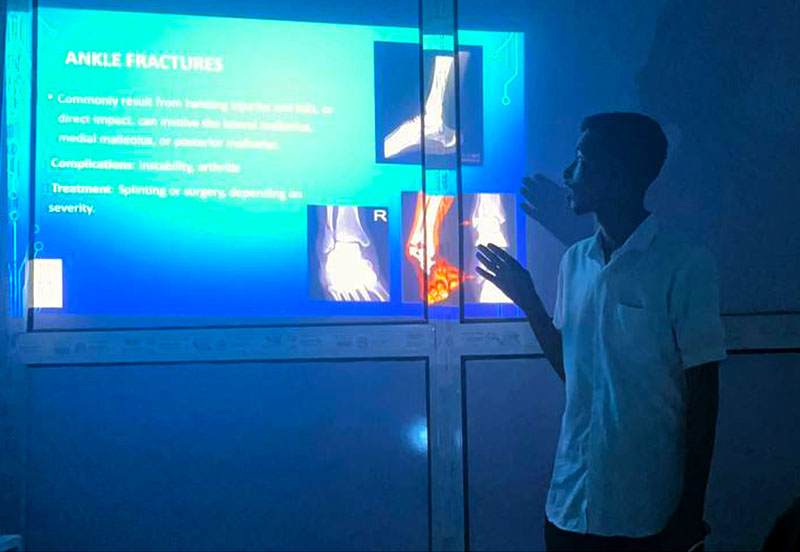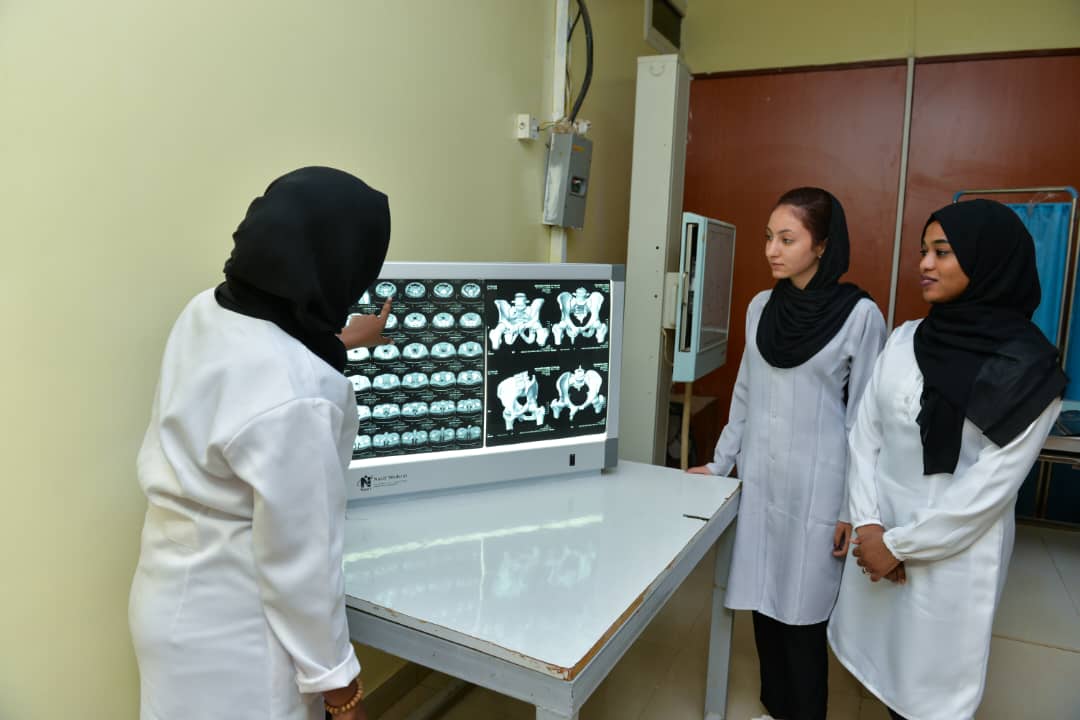Faculty of Radiography and Medical Imaging Science

The radiography and medical imaging programme was launched in 2006 under the then-National College for Medical and Technical Studies. It follows a semester system over four years, totalling eight semesters plus optional summer units. The initial semesters cover preparatory and shared general sciences, followed by specialisation from semester 4 through 8.
NUSU leads in adopting modern educational techniques in radiographic training in Sudan, including problem-based learning (PBL), seminars, field placements, hospital clinical practice, and research assignments, based on recognised national standards and ISO‑9001‑2008 certification.
In 2016, NUSU received full accreditation from the British Accreditation Council (BAC) for three years, becoming the first and only Sudanese higher education institution internationally accredited by BAC. BAC accreditation involves a comprehensive external evaluation of: Institutional governance and administration, Teaching and learning quality, Student welfare and support and Premises and facilities standards. This international certification added a layer of external validation beyond local approvals, enhancing the credibility of all programmes, including radiography and medical imaging, on a global stage. While there’s no separate faculty-level BAC registration, the radiography programme benefits from its inclusion within the wider institutional accreditation. Quality assurance: BAC accreditation promotes ongoing evaluation, curriculum updates, and alignment with international teaching standards. Global visibility: Credentials from a BAC-accredited university are more recognisable when graduates seek further studies or professional recognition abroad. Institutional credibility: As a whole, NUSU’s BAC status reinforces trust in associated faculties, including Radiography & Medical Imaging, contributing to broader academic and clinical partnerships.
Our Vision
To be a leading center of excellence in radiography and medical imaging education, research, and clinical practice, producing globally competent professionals who advance diagnostic healthcare, contribute to scientific innovation, and enhance community wellbeing. The vision emphasises academic and clinical excellence, leadership in diagnostic imaging sciences, global relevance with local impact, and a culture of innovation and continuous improvement in healthcare.
Our Mission
Our mission is to provide high-quality education, research, and clinical training in radiography and medical imaging to develop competent, ethical, and innovative professionals who advance healthcare services and diagnostics locally and globally.
Our Values
The following principles are explicitly emphasised in radiography and imaging science contexts:
- Professional integrity embodies honesty in patient care, teaching, research, and collaboration, consistent with university ethics.
- Ethical patient-centered care involves treating patients and families respectfully, maintaining confidentiality and aligning with national ethics codes.
- Scientific excellence & diligence, uphold high standards in imaging science education, research rigour, and clinical practice.
- Equity & inclusiveness serve all communities, including rural and underserved areas, without bias.
- Innovation & lifelong learning encourage continuous improvement, creativity, and adoption of new imaging technologies and methodologies.
- Social responsibility involves engaging with community health initiatives, encouraging participatory planning, and addressing cultural and environmental needs.
Our Objectives
The objectives of the National University-Radiography and Medical Imaging Science Programme are to:
- Preparing qualified graduates in the field of medical imaging technology to satisfy the needs of the employment market and development plans.
- Providing students with theoretical knowledge and practical applications in various aspects of radiological and imaging techniques
- Qualifying students with the technical skills necessary to operate sophisticated diagnostic imaging equipment, as well as those for simple maintenance and troubleshooting.
- Providing knowledge, skills and attitudes needed to administer diagnostic medical imaging units, and satisfy the requirements of quality control.
- Acquisition of professional ethics and teamwork approach.
- Provision of theoretical and practical information needed for involvement in research and evidence-based imaging.
- Development of self-education skills that qualify students for further education, including graduate studies and self-directed learning.

The Curriculum Objectives
A graduate of the Faculty of Radiography and Medical Imaging Program should be able to:
- Adopt the strategies of the National University- Sudan and abide by its objectives, rules and regulations stated in the Order of Establishment (NC-Docs-8/1, dated January 2005, updated 2008).
- Observe, in his/her practice, the health professional ethics which agree with the Nation’s values, beliefs and norms as stated by the Sudan Allied Health Professions’ Council, and maintain good and honest relations with her/his patients, their families, his/her colleagues across all sectors involved in health.
- Integrate basic, technical, clinical nursing and laboratory sciences in solving imaging problems of the individual relevant to radiological sciences and practice.
- Use scientific knowledge in radiology and imaging, according to known methods of problem solving and integration, and show understanding of the scientific structural (anatomical), functional (physiological, biochemical), morbid (microbiological, pathological), and technical (physics and equipment) therapeutic (pharmacological) background related to the problem.
- Attend professionally when imaging a patient with an emergency or multiple trauma and perform life-saving procedures and critical care, and decide and act properly on cases needing consultation with colleagues or referrals to specialised centers or personnel.
- Show patience and tolerance when sitting and/or standing for a relatively longer time in doing work, especially in patient or unit conditions, well beyond working hours.
- Handle chemical, biological and dangerous materials or ionising radiations with caution and safety using the scientific approaches stated in procedures for dealing with these materials or radiations.
- Interact with the patient and family in a friendly and humane manner. Perform the medical history and physical examination according to the standard scheme.
- Ensure that responsibilities for patient hygiene, injury prevention, and vital sign recording are carried out according to the prescribed procedures.
- Obtain radiographs or other images from patients in a timely and professional manner, considering the technicalities and limitations of the machines in use.
- Accept to work in all settings, urban or rural, served or under-served, according to needs, and acts to improve health service delivery systems both quantitatively and qualitatively.
- Encourage community participation in patient and community health and help in recruiting various sectors in defining relevant health-related problems, planning and providing suitable imaging solutions, recognising the community beliefs, ethics and traditional practices.
- Adhere to the “health team” approach, acting as an efficient member, accepting labour and responsibilities given to its members, and promoting both effectiveness and homogeneity among members.
- Continue to consider elements of efficiency, costing and economic implications in her/his radiological and imaging interventions.
- Acquire the skills of teaching, learning and communicating efficiently to carry out her/his duties in health education, explaining procedures to patients and in winning the confidence of them and their families.
- Show respect to patients, supervisors, and colleagues, using satisfactory communication with them and maintaining confidentiality at all levels of communication and care.
- Acquire the skills of independent learning and contribute to availing opportunities for planning and implementing continuous educational activities to upgrade her/his abilities and those of her/his colleagues in the health team, benefiting from information technology.
- Carry out health or health-related research in imaging, alone or with other members of a team in health or other relevant sectors, particularly medical physics and quality control, using known and approved scientific methods.
- Use computers in word processing of (both Arabic and English), presentations, spreadsheets, statistical packages and graphics to achieve success in other objectives of her/his career.
- Acquire a postgraduate qualification in the discipline of her/his choice, recognising the needs of society for certain specialities, particularly emergency and critical care imaging, trauma imaging, radiation protection and imaging choices in primary health care.

Educational Strategies
As stated in the Academic Regulations, the learning strategies emphasise the following: (1) early acquisition of basic skills, (2) student-centered learning, and maximum student responsibility in the learning process, (3) problem-based and problem oriented instruction, (4) community-oriented and community-based activities, (5) integration of basic science, community and clinical practice, in a multidisciplinary approach, (6) self- and peer- education and evaluation, wherever relevant, (7) team-work attitude, (8) a range of elective modules, (9) continuous evaluation, (10) preparation for continuous professional development.
Instructional Methods
The Faculty adopts the following methods in the daily programme of activities:
(1) problem-based learning (PBL) sessions- one problem/ week at most, (2) seminars and small group discussions, once/ week at least (3) field practice in rural and primary health care settings and societies not less than 1/5th of the timetable, (4) practical sessions (laboratory, clinical, pharmaceutical industries) not less than 1/4th of the curriculum timetable, (5) skill laboratory (weekly) sessions, (6) lectures -not more than 1/3rd of the curriculum timetable (not more than three lectures/day). (7) Educational assignments, reports and research activities (as many as the program would allow- at least one per module), (8) electives -not more than 10% of the curriculum timetable, and (9) graduation project.
Evaluation
Short modules (three weeks or less) are evaluated on the first Saturday following the last session of instruction through best answer MCQs, brief answer questions and problems. Continuous assessment should include attendance, contribution, coordination, assignments and seminars. Practical examination (if relevant) should be arranged during the course of instruction or on the Wednesday/Thursday that precedes the theoretical examination on Saturday. Unless the dean and coordinators justify an exception and permission, the regulations of the faculty do not consider oral examination as a fair means of assessment; however, it is often indicated in imaging sciences and practice.
Longer modules (four weeks or more) are evaluated by mid-course and end–of–course examinations. The former should not account for more than 20% of the total marks. The theoretical examination of either is done on the mid- and final Saturday of the module. Other details (as in short modules) are the same.
Administration
Prof. Mohamed Elfadil Mohamed Garelnabi
Faculty Dean
Professor of Medical physics & Imaging, Medical Ultrasound and Radiation therapy
Prof. Maha EsmaeelAhmed
Deputy Dean
Professor of Radiography and Medical Imaging
Mrs. Sulafa
Registrar
Prospectus ![]()
Academic Staff (2024-2025)
| Name | Academic Rank | |
|---|---|---|
| Maha Esmeal Ahmed Esmeal | Professor | mahaegypt88@gmail.com |
| Mohamed Elfadil Mohamed | Professor | mohamedelfadilmohamed@gmail.com |
| Alsir Ali Saeed | Assistant Professor | — |
| Amna Ahmed Mohmed Mokhtar | Assistant Professor | amnamoktar27@gmail.com |
| Ashraf Mustafa | Assistant Professor | ashrafmerafabi@gmail.com |
| Lana Haider Ahmed | Assistant Professor | Lana.haider22@yahoo.com |
| Rehab Musa Eltrifi | Assistant Professor | rehabaltrifi@gmail.com |
| Ammar Abdalla Ali | Lecturer | ammaro2021986@gmail.com |
| Mohamed Omer Mohamed | Lecturer | Mohammedomer2420@gmail.com |
| Nahla Abbas Ahmed | Lecturer | nahlaabbas273@gmail.com |
| Nieama Mustafa Abdalrahman Mohamed | Lecturer | Niema.mustafa95@gmail.com |
| Salwa Abubaker | Lecturer | SalwaKundi@gmail.com |
| Mohammad Almogtba Dawina Abdalrhman Harun | Clinical Instructor | moalmogtbadawina1200@gmail.com |
